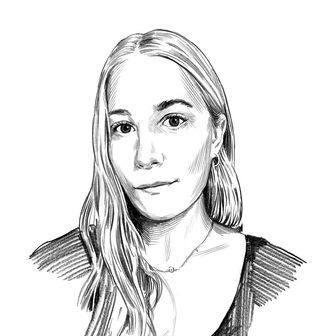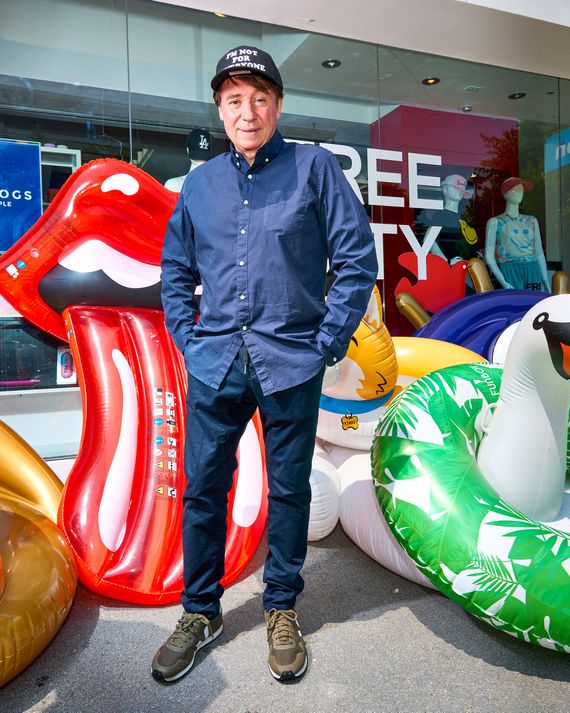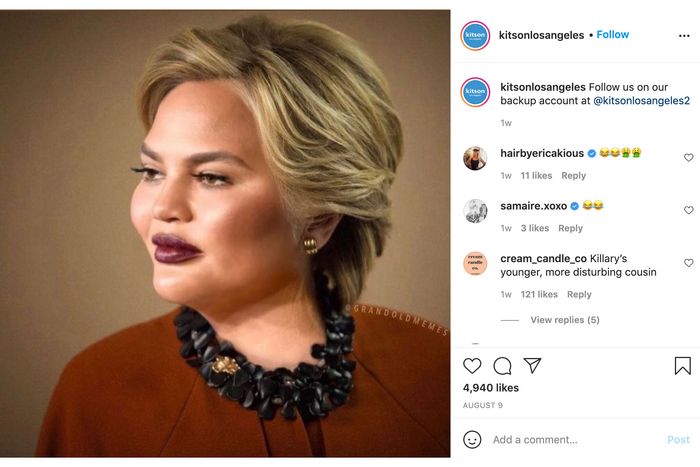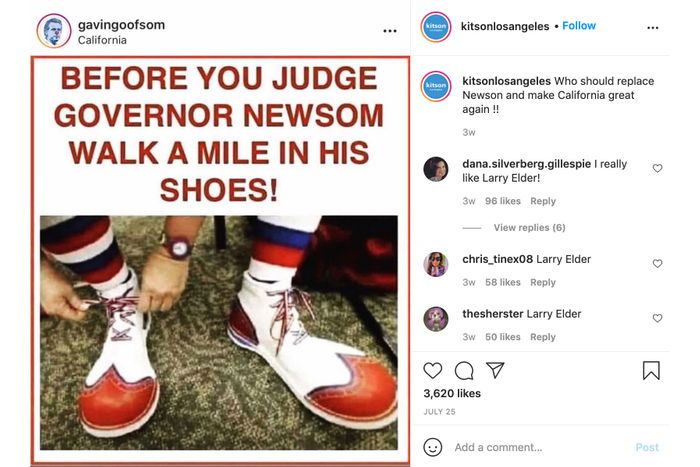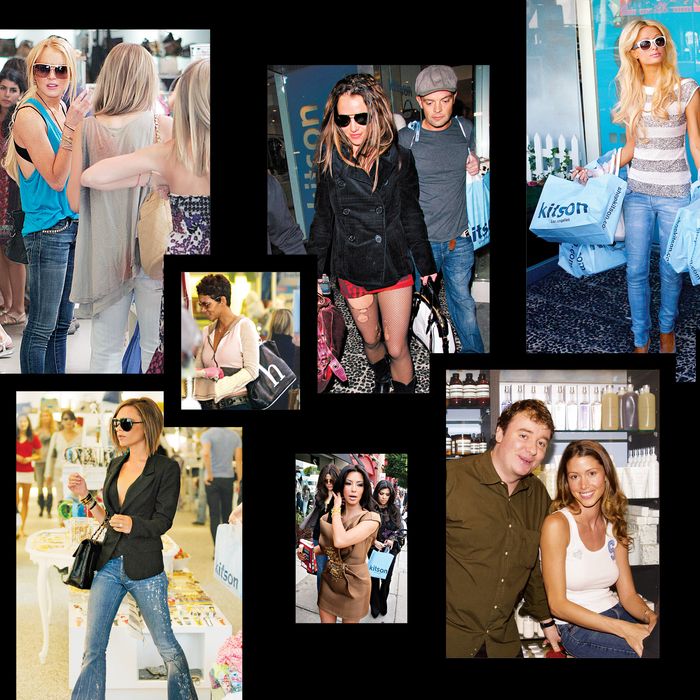
This article was featured in One Great Story, New York’s reading recommendation newsletter. Sign up here to get it nightly.
Everything old is new again,” Kitson owner Fraser Ross said with a sigh over the phone from Beverly Hills* in August. We were discussing the booming nostalgia market that is churning out early-aughts fashion and pop-culture trends for renewed consumption two decades later: low-rise jeans, mini-backpacks, Paris Hilton, Bennifer. They’re all back in the Zeitgeist, with only slight tweaks.
Ross opened Kitson, what he called a “general store for the rich,” on Robertson Boulevard in 2000, selling everything from designer cashmere to graphic tees, Swarovski-encrusted hairbrushes, and diet books. Ten years before the launch of Instagram, when celebrities still relied on People’s “Star Tracks” to publish their candid photos, they would pop into Kitson for a new set of True Religion flares before lunch on the patio at the Ivy. Stars and starlets — some A-list, many more C and D — would teeter out of its doorways laden with baby-blue shopping bags to see and be seen by a waiting swarm of photographers. It was where Britney Spears went on a shopping spree at two in the morning, in ripped-up tights, before being hospitalized. It was where Kobe Bryant bought bracelets (leather, diamond-studded, $3,000 each) for his wife after being accused of infidelity. Warner Bros. once threw a lavish industry party there in order to, in Ross’s words, “make Tweety Bird hip and hot.”
Ross and Kitson, seemingly, have an opportunity to cash in on the millennium reboot moment. He could sell a cool-again baguette bag next to a picture of Hilary Duff carrying its 2005 predecessor. He could be a docent in the Kitson living museum, recounting the exploits of his favorite customers while selling their tell-all memoirs.
Instead, head to the Kitson Los Angeles Instagram page, on which you will find reposts from right-wing commentator Mike Cernovich about vaccine passports and a screenshot from Christian satirical news site The Babylon Bee making fun of Black Olympic athlete Gwen Berry’s turning her back during the national anthem.* (“I thought you guys sold clothes?” one commenter wonders. Another writes, unsettled, “This feels like the QAnon of retail.”) Adorning Kitson’s large windows for a while was a banner that read #SURVIVINGCHRISSYTEIGEN, sparked by Ross’s criticism of her pledge to bail Black Lives Matter protesters out of jail. When paparazzi come by these days, they catch Family Ties actress Justine Bateman — signing a petition to recall California governor Gavin Newsom.
Kitson is still Kitson, Ross, 57, confirms, but a righteous Kitson, a Kitson with a purpose. “A lot of people don’t want Kitson to evolve,” he says of the transformation in his branding, which one could describe, in terms of audience, as going from Us Weekly to Newsmax. “Some people want me to go back to the days of celebrities, paparazzi.” But others, Ross claims, a new group of activist customers, are thanking him for doing “the work of God.”
The origin story of Kitson’s fame starts with the letter H, for Halle Berry. The star bought a monogrammed leather bag with her initial on it one day at the store in 2002; when she returned soon after wearing her purchase, Ross suggested Berry turn the bag around on her hip so it showed the H to the cameras outside. The photos of Berry, fresh off her Oscar win for Monster’s Ball, were picked up everywhere; Ross sold $1.3 million worth of the same initialed totes, by designer JAM, to the masses. The pattern would repeat with boots and belts, trucker hats and tinted sunglasses.
Kitson was not Ross’s first celebrity-focused foray into retail. Raised in Scotland and Toronto, Ross opened a high-end boutique, Ice, in 1989. Kitson became Kitson after Ross met Jill Ishkanian, then an Us Weekly reporter who, in late 2002, dropped off her business card at the store. She wanted gossip. Other nearby spots, like Lisa Kline, had rebuffed Ishkanian; they didn’t allow photographers near their customers and certainly didn’t talk to reporters about them. Ross, however, gave Ishkanian a call. They worked out an efficient system: Ross would provide Ishkanian with details of his famous shoppers’ actions and moods, what they bought, and whom they were with, and she would get Kitson splashed on the pages of Us Weekly, effectively netting thousands of dollars in publicity for free.
The racket was a runaway success. By 2004, Kitson was doing $18 million in business. Crucially, celebrities benefited from the arrangement too. If they wanted to drum up press for a movie or debut a new relationship, they could rely on Kitson’s steady stream of paparazzi to keep them in the conversation with well-timed photos. It was the place to be if you were “thirsty and wanted to be photographed,” says Perez Hilton, whose gossip site took off in the same ecosystem. When blogs sniped at Lindsay Lohan for her weight, she left Kitson wearing a SKINNY BITCH T-shirt; when Kim Kardashian wanted to break out of her former employer Paris’s shadow, she went on a shopping spree at Kitson, where she was mobbed by her own fans. Notorious The Hills villains Spencer Pratt and Heidi Montag loved Kitson. “That block was hot,” Pratt says now, above the sounds of his son, Gunner, playing at home in the Palisades. “If Robertson was Disneyland, Kitson was like the gift shop.” Sometimes, he recalls, employees would hand them bags of kitschy goodies to hold when they exited the store. Eventually, Kitson carried TEAM HEIDI and TEAM LC shirts during the fallout between Montag and her former best friend, Lauren Conrad. (Pratt purports that the TEAM HEIDI shirt was a better seller.) It also carried Montag’s clothing line, Heidiwood; Paris’s, Kim’s, and Nicole Richie’s too; and Gwen Stefani’s L.A.M.B., Victoria Beckham’s dVb denim line, and Lohan’s short-lived handbags.
Kitson married the high and the low in what People’s Revolution PR-firm founder Kelly Cutrone (who also did a stint on The Hills) describes as “bling-ring leisurewear.” It was luxurious and bohemian, decadent and sloppy. “It was grab-and-go fashion. It didn’t take itself too seriously,” Cutrone says. With brands like Wildfox, Ed Hardy, and Rebel Yell piled on its tables like a flea market, Kitson was more democratic than Fred Segal, Saks, and Barneys. “Kitson was just like the Statue of Liberty of L.A. fashion wannabes. They were just like, ‘Bring us everybody!’ ” says Cutrone.
Ross’s shop helped to pioneer what we can now identify as influencer culture. He understood that consumers prefer celebrities they can almost touch to the untouchable ones. It was still a store in one of the wealthiest Zip Codes in the country, but if you couldn’t swing $800 Great China Wall embroidered cargo pants, you could still leave with a $38 MRS. KUTCHER T-shirt or a Von Dutch trucker hat. “We were entertainment,” Ross explains, “because you could stand in the store and walk up to the headband area and buy that headband with Paris Hilton in a picture wearing it. You can’t go to the clubs, but you can always come to club Kitson.”
The retailer-paparazzi-celebrity symbiosis proved fragile and sometimes turbulent. There were squabbles: Ross had to meet privately with Beckham after he told People she wasn’t promoting her denim line enough (they eventually made up). In 2005, Ishkanian left Us Weekly to open her own paparazzi business, Sunset Photo, with Ross as a financial partner with a limited stake, he says. Ishkanian was accused by her old employer of hacking into its computer system, and her home and business were raided by the FBI, though she was never arrested or charged. Ross sued Us Weekly in 2006 for breaking an alleged coverage agreement. Kitson bags and the storefront were being cropped and airbrushed out of photos in Us Weekly’s pages, he claimed. (The lawsuit was eventually settled.) He also sued or was sued by Target, Richie’s apparel manufacturer, and a luxury mall in Glendale.
Those are all catfights compared to the real Kitson drama, what Ross refers to cryptically as “the bump on the way.” By 2011, Kitson had weathered the Great Recession, ballooning into Kitson Kids and Kitson Mens, Kitson at LAX, Kitson at the Mall of the Emirates in Dubai. Fans could buy Kitson-branded sneakers and makeup bags. Ross was prepared to sell the company, which was by then worth $25 million, and hired Chris Lee, a former VP at Forever 21, to help guide him.
The next year was horrifically life-altering for Ross, he says, after a dental procedure left him with an infection so severe he was in a medically induced coma for two weeks at Cedars-Sinai. (On one of the days Ross was on life support, he remembers, Sofia Coppola was in Kitson filming The Bling Ring.) According to Ross, the business suffered in his absence, and in a lawsuit he filed in 2016, he claimed that during his recovery, Lee “seized on” his vulnerability, encouraging him to turn down a $26 million offer from Tengram, the private-equity firm, in 2013. Instead, he agreed to a $15 million loan from Salus, a now-defunct lending firm known for its role in the demise of RadioShack, over dinner with company representatives at Wolfgang Puck’s Spago. It would eventually come out in the lawsuit that Salus didn’t have the required license to lend in the state of California.
Under the new arrangement with Salus, Ross claimed, the number of stores expanded even further to off-brand locations like the Orlando airport, the quality of products declined, and payments to vendors became late, according to reporting by Women’s Wear Daily. In 2015, Ross loaned an additional $2 million of his own money to the company, and Salus, to shore up its position, took out an additional $4 million from another lender, Spencer Spirit Holdings of Spirit Halloween-store fame, through an affiliate called BHK Investments. Ross claimed that while medicated during a relapse of his illness, he was encouraged to sign a letter of resignation and sign over his stake in the company to Lee as well as to unknowingly give up his right to recoup his $2 million. By the end of the year, Kitson was in liquidation.
Ross has amended the lawsuit three times; the current version, filed in 2018, has dropped Lee, and the claims levied against him have instead been levied against Salus and its parent company, HGI Asset Management Holdings; Spencer’s; and BHK. The suit claims that, “through a fraudulent scheme known in the industry as ‘pump and dump,’ Salus and BHK stockpiled excess inventory immediately prior to closing the Kitson boutiques.” After the shops closed, the suit claims, Salus and BHK liquidated the stock and refused to pay back vendors. Salus has been accused of predatory practices in three other bankruptcy and liquidation filings, per WWD. (Representatives for Salus and HGI declined to comment.)
The press coverage focused on Kitson’s slow retreat from the cultural milieu (one of the last celebrity book signings at the store was that of the late Grumpy Cat), its past lawsuits, and its going-out-of-business sales. Ross says the media missed the big story: that Ross and Kitson were the victims of fraud. “It was just Wall Street corruption at its highest,” Ross says. The lawsuit remains a tangled nest of complaints and counter-complaints; in 2020, a judge dismissed it on the grounds that Ross, without shares, didn’t have the standing to bring claims on Kitson’s behalf. He has appealed the ruling.
The ordeal left Ross feeling as if he had lost a child. He had grown Kitson, to which he gave his middle name, from nothing; Ross says he grew up partially in an orphanage after being “abandoned by my parents at a young age.” When he reopened in his old space in 2016 as Kitross, many vendors refused to return. He eventually operated as Kitson again in 2018 after paying California $158,000 in back taxes.
His mission since has become taking a stand against the sinister, nebulous forces that tried to take him down. “They didn’t want me to come back, which I have, from the ashes and tell the real story,” he says. “They” are a cabal of politicians, corporations, and media editors working together to hold on to power. The course of the past decade, the events of which Ross replays at a constant, cataloguelike clip, has convinced him that he is working against this swirling morass of corruption and pay-to-play access politics. First, there were the commercial landlords who raised rents astronomically, driving out many of his neighbors; then there were online retailers like Amazon that drove out the ones who tried to stay (“Amazon, to me, is the Devil,” per Ross). Then there was the corporate siege of Kitson, which almost ruined him. Most recently, it was an authoritarian power grab known as the coronavirus pandemic.
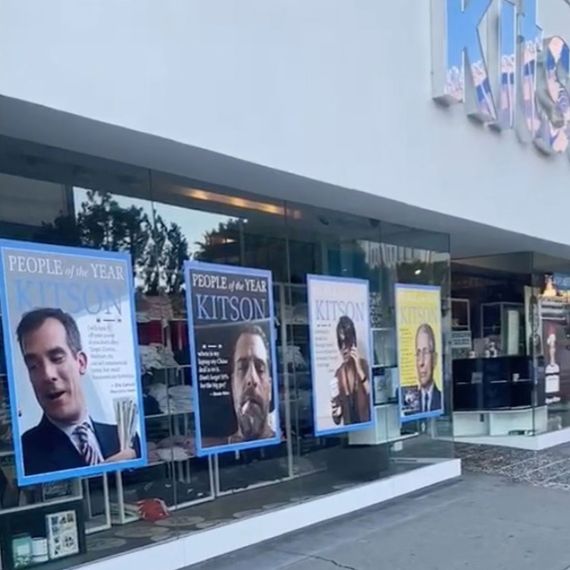
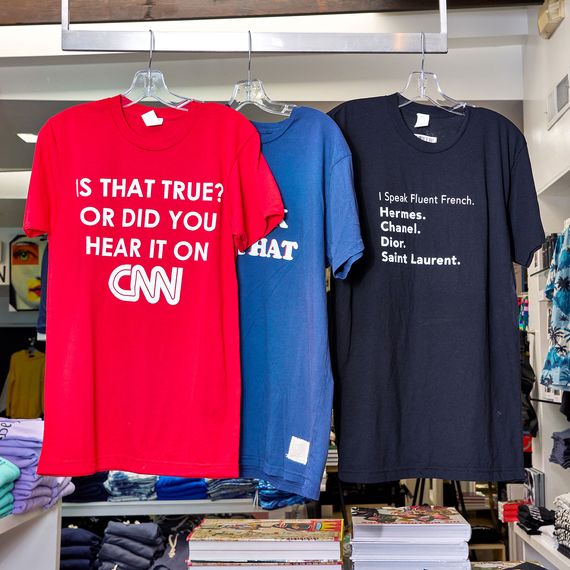
In April 2020, Kitson on Robertson must have looked like it did after liquidation, with locked doors and papered-over windows. Looking around at L.A.’s bustling Targets and Walmarts during lockdown, Ross couldn’t fathom why small businesses like his weren’t deemed essential despite selling the same things Beverly Hills residents were masking up at the megastores for: pool floats, candles, greeting cards. He estimated he was losing hundreds of thousands of dollars while closed. In a letter to L.A. mayor Eric Garcetti posted on Instagram on May 23, 2020, Ross railed against the preferential treatment of big-box stores, which were “crowing in the media that they have had 20 percent increases during this pandemic. Yet you mayor have restricted trade to the small businesses like mine that are the backbone of this Los Angeles economy.” On May 25, in a David-versus-Goliath victory, the announcement came that all retail stores would be allowed to open. “Team Fraser for Mayor,” read the store’s post about the news.
Five days later, Ross reports, his outlet location was looted during uprisings against police brutality in the city. Ross, who took video of the damage, estimates he lost $300,000 in merchandise, though it was covered by his insurance. Ross was appalled when Chrissy Teigen, an outspoken supporter of Black Lives Matter, offered $100,000 in bail money for protesters; when a Twitter user commented that Teigen was bailing out “rioters and criminals,” she doubled the amount. A convoluted fracas followed. Ross tagged Teigen in a since-deleted Instagram post taking issue with her stance. When Teigen’s hairstylist, Jen Atkin, owner of the hair-care brand Ouai jumped into the comments to back Teigen, Ross wrote that Ouai was the only stock in his store that wasn’t looted. In screenshots, Atkin replies flippantly that Ross should “use the shampoo to clean up the graffiti” and makes a joke about “looter hair cream.”
The exchange prompted an ongoing campaign, with Ross posting repeated demands for apologies from Atkin, Teigen, and the CEOs of Alliance Consumer Growth, a private-equity firm with a stake in Ouai and in Skims (which added the Kardashian family to Ross’s list of adversaries). “Investment companies have to take a moral stance when ignorant founders and executives mock looting,” Ross wrote. Neither Teigen nor Atkin will comment on the issue.
At this point, the Kitson Los Angeles account was posting news items only occasionally alongside product shots of GUCCI BITCH porcelain dishes and Schitt’s Creek coloring books. That changed in November 2020, when Newsom was caught having a large unmasked luxury dinner at Thomas Keller’s French Laundry restaurant. “That was it. You lost me,” Ross says. The hypocrisy sent him into creative overdrive. He not only had a RECALL GAVIN NEWSON trailer parked in front of the store where Bateman went to sign the petition; he put up a gallery of “the Hypocrites of 2020” in Kitson’s windows, featuring Newsom, Teigen, Nancy Pelosi, and Alyssa Milano. A second window with satirical “People of the Year” included Garcetti, Anthony Fauci, Hunter Biden, and “Karen.” It went viral after Donald Trump Jr. posted about it on Instagram.
Holiday orders skyrocketed, and Ross called in Ishkanian to work the phones. Over the years, she has helped out as an unofficial consultant for Ross’s holiday displays, which she emphasizes are nothing new (in 2016, for example, Ross made waves for a “Make Robertson Great Again” window). She still coordinates with him as a freelance reporter: Ishkanian’s byline appears on the Daily Mail stories about Bateman signing the recall petition and about a visit to Kitson from the salon worker who had exposed Pelosi’s maskless haircut. (The worker had let Ross know she was coming to see the windows in advance.) Ross was the one who tipped off Ishkanian that Teigen had appeared in her Instagram Stories next to a can of Goya beans, soon after she helped encourage Americans to boycott Goya for supporting Trump. “EXCLUSIVE: Full of Beans!” Ishkanian’s Daily Mail headline read.
Since December 15 of last year, Kitson hasn’t had a single retail product on its Instagram feed. Products — Freecity sweatpants, YOU ROCK mugs, bracelets that ward off the evil eye’s curse — go into its Stories. Posts don’t just criticize lockdowns; they are all in on any form of hypocrisy or mismanagement by famous Democrats, and they have not been short on inspiration. Ross seems increasingly skeptical of lockdowns and mask mandates, reposting memes from accounts like @wearebreitbart and @patrioticbabeofficial about masks and the Texas Democrats leaving Texas. Ross has appeared on the right-wing One America News Network, whose channel was suspended from YouTube in 2020 for spreading coronavirus misinformation, to talk about how “business owners have had enough” with the government.
Ross maintains he is not a political person; as a Canadian citizen, he can’t even vote in the U.S. He reminds me that one of Kitson’s Valentine’s Day windows said “I ❤️ you even though you’re a Democrat” and the other “I ❤️ you even though you’re a Republican.” He simply has a profound sense of injustice on behalf of America’s small-business owners — a sentiment shared in the recall movement by a cohort of wealthy California conservatives (one of the lead donors behind the effort is a Beverly Hills real-estate developer). Ross’s worldview could be described as somewhat incoherently libertarian: In his letter to Garcetti, for example, he slammed Los Angeles’s “endless public programs” (the city’s homeless, for one, would quibble with this), though his business received two Paycheck Protection Program loans from the federal government totaling $334,455; he is critical of censorship but has lobbied to get Teigen dropped from her endorsement deals.
Political or not, Kitson is trending. Its follower count has increased from 15,000 to 47,000 during the pandemic — Ross believes it would be even higher if he weren’t shadowbanned, a secret censorship policy that Instagram denies exists. He claims business is very good; Ross refers to his door as “the Archway,” and through it, he says, new customers who saw Kitson’s Instagram come in and thank him for his work. “Some big-name celebrities, too,” he tells me, but he won’t say who. In the store’s posts, which Ross dictates to an employee via text, the edges around the talk of conspiracies and cover-ups are getting ever fuzzier. “Who thinks the media is lying and the government is doing something shady,” a post recently asked without elaborating. More than 9,000 people liked it.
In Ishkanian’s telling, she and Ross are working the same setup as Kitson 1.0, adapted to the current appetites of the attention economy. “Literally no one cares about celebrities anymore,” Ishkanian says. “J.Lo’s trying to, by doing staged pictures, resuscitate something from 2003,” referring to recent paparazzi photos of Jennifer Lopez and her 2002 fiancé, Ben Affleck. Ishkanian knows former celebrity photographers who used to get thousands per snap who are now driving for Uber Eats. One works in the Border Patrol. Instead, Ishkanian says, political stories are what go viral, especially in the pandemic. “I pitch my editor at the Daily Mail a Tori Spelling story or a story about how the founder of BLM is building a wall around her house — which one do you think she’s going to take?” she asks me. (Ishkanian is referencing a story she wrote two months ago about the fence Patrisse Cullors reportedly built around her Topanga Canyon home.) “You have to adapt,” she adds. “Did I love political crap before? No. But now I would get more excited to see Gavin Newsom than I would Brad Pitt.”
“It’s two sides of the same coin, entertainment and politics,” reasons Hilton (Perez, not Paris). “People consume it the same way: obsessively. It’s a form of entertainment disguised as trying to make things better.” Even he has pivoted, agreeing to an interview only if I identified him as a co-owner of CBD-gummy brand My True 10.
If Ross has spotted a gap in the market on which to stake his future business, it is trust. It makes a perverse kind of American sense that a “general store for the rich” would have a second act as a pseudo-populist media platform. “I’ve broken national stories,” Ross says. He recently took his operation to another level, visiting the office of Yusef Robb, a former director of communications for Garcetti who has acted as a spokesperson for the Mayor’s Fund for Los Angeles, a nonprofit the city uses to support public projects. Ross is skeptical of where the over $70 million is has raised is really going.* After watching a local news piece about the fund, Ross found Robb’s office address, headed downtown, and stopped by to snap a picture of the office. Robb followed him down to the parking lot and blocked his car, claiming he had “stormed the building like the Capitol,” Ross says. “I’m an investigative reporter all of a sudden.” (He recently sued Robb for defamation and false imprisonment; a rep for Robb says he “firmly denies the validity of the claims alleged.”)
Decades after being papped to oblivion at Kitson, many of Ross’s former customers have expressed regret about falling into the trap of infamy, in which the more they acted out, the more scrutiny they received. “Playing politics is as dumb as it can get if you’re doing it just for fame,” Pratt warns. “We learned that a long time ago.” He was bringing up photos he and Montag staged in 2008, in which the couple, decked out in McCain-Palin regalia, drank Budweiser and read the book You Can Profit From a Monetary Crisis. “We literally were like, ‘John McCain!,’ just because we met Meghan McCain and went to lunch with her, and we’re like, ‘Oh, we’re going to get to go to the White House with this girl.’ ” By the inauguration, they were mountain biking in OBAMA T-shirts.
“Usually, this is a no-fly zone,” says Cutrone about the intersection of politics and fashion. “But we don’t know what’s going to happen. Maybe he is going to become the MyPillow guy of L.A. fashion.”
I asked Ross if he’s worried about what the success of his publicity strategy says about where we’re headed. Does he fear that the stakes will keep rising like floodwaters around us; that fact and fiction, truth and trolling, will become impossible to untangle? Does he really believe that Teigen and John Legend, as commenters on his posts allege, are part of an elite pedophile circle that eats children? “Well, there’s a lot of, you know, rumors out there on it” was his response. A post he made on July 29 reached 298,185 people on Instagram, according to stats he sent me; it was a video encouraging people to resist lockdown mandates, reposted from a woman with a couple thousand followers whose profile says she has a skin-care line. In a highlight on her Stories, she hosts videos from “former Illuminati insiders” who say Beyoncé and Meghan Markle are competing for a role in the organization known as Dark Mother.
Ross’s reference to rumors reminds me of the video for Lohan’s 2004 pop single of the same name, in which she runs from a pack of photographers. “I’ve gotta say respectfully,” Lohan sings into the camera, “I would like it if you take the cameras off of me.” (“Rumors” opened the spring 2020 Balmain runway show in Paris.) A quotation hangs over Kitson’s dressing rooms, widely attributed to Ziad K. Abdelnour, the CEO of private-equity firm Blackhawk: “Rumors are carried by haters, spread by fools, and accepted by idiots.”
*This story has been updated to more accurately reflect the contents of an article that Ross posted. It has also been updated to clarify where Ross was speaking from when he was interviewed and to correct the amount raised by the Mayor’s Fund for Los Angeles.
More From Fall Fashion 2021
- The People Who Make Those $10,000 Couture Gowns
- Am I Ready to Become a Hat Girl?
- The Global Pursuit of a Bigger Butt


